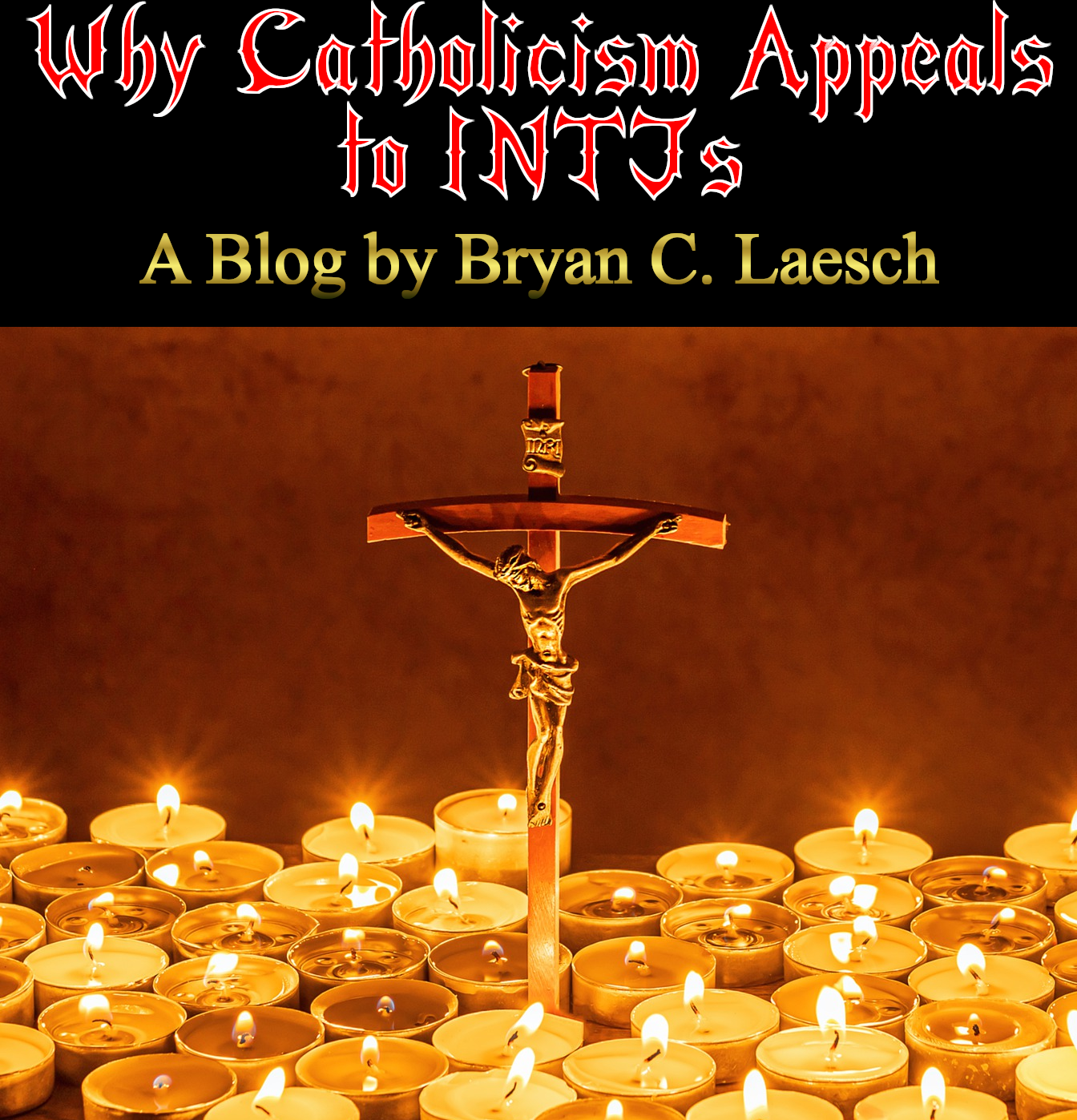Good news, everyone!
My last blog was What INTJs Like about Christmas, and in it, I did rant and rave a little when it came to Ni. I’m sure the appeal of my Catholic faith was on display for all to see. And I’m sure that many people are surprised to hear that I am Catholic. INTJs are statistically the least likely of all the types to believe in a higher power, and yet, 64% of them do. So, we may be the lowest statistically, but 64% is still a majority of INTJs. But given how individualistic and skeptical INTJs can be, wouldn’t it make more sense for them to create their own religion or practice one that doesn’t seem hypocritical? Well, lucky you, I am about to defend my faith, or more specifically, my belief in my faith. Get ready, kids. This is why Catholicism appeals to INTJs.
A Few Clarifications
Before I begin with the blog proper, let’s get a few things straight. Catholicism is not hypocritical (put your faith in God, not in people), it does not hate women, and it is not a weird cult. I’m not going to expound because it’s not my job to explain such things, especially when we live in the Information Age. You have no justification for being ignorant when Google and the rest of the Internet lives in your pocket. Google the answers and make sure you look them up from a Catholic source. And if you’re still not sold, then you are simply a hater, and as they say, haters gonna hate. And as it says in Matthew 7:6 (NSRV) “Do not give to dogs what is holy, and do not throw your pearls before swine, lest they trample them under foot and turn to attack you.” Yes, that’s right—haters are dogs and swine.
The Appeal of…
So, with that out of the way, let’s get into why Catholicism appeals to INTJs. And I’m going to break these appeals down as they appeal to the functions, but the first thing I mention—theology—does appeal to two functions. Just so you know.
Theology—Ni and Te
As stated above, the first appeal of Catholicism for INTJs is its theology, which appeals to an INTJ’s primary and auxiliary functions, Ni and Te. Ni pursues the truth, and so it likes to contemplate the nature of God and the life He calls us to. And it is likely that through Ni we experience the phenomenon of divine revelation, or Ni is what causes us to learn as much as we can about God through various sources. And as we contemplate God’s nature, His ways, what has been revealed to us, and our part in His plan, we then apply a bit of logic to the whole thing and we are able to answer the mysteries of life. That’s what theology is—logical thought about divine insight.

Now, that all sounds good, but what does it actually mean? To illustrate my point, here’s something I thought of recently:
So, autoeroticism is a sin, but many wonder why. Where the explanation usually starts is with the saying “it’s better for you to spill your seed into the belly of a whore than on the ground”. I’m not sure where this saying comes from as it’s not in the Bible, although Genesis 38:7-11 (NSRV) does come close. Basically, Judah tells Onan to have sex with the wife of his brother (Er) because his brother died before having children. But instead, Onan spills his seed on the ground, and God gets pissed and kills Onan. (This is why we call masturbation “Onanism”.) But why would God be mad about this?
Well, I’m not going to get into that specific example as God was very involved in the lives of the early Jews. Plus, parts of Genesis read more like Greek mythology than sacred scripture. But the implication is that God was mad due to the waste of potential life. And further, it is spelled out in the Catechism of the Catholic Church that sex has two main functions: to bring a married couple closer together and to bear children. And what Onan did neither brought him closer to his brother’s wife nor did it offer any chance at bringing forward new life. Now, that’s great and all, but how does that relate to my point about Catholic theology appealing to Ni and Te?
Well, by saying that one of sex’s main functions is to bring a couple closer together, we understand that autoeroticism is sinful because it is pleasure for the self. (I’m sure you’re familiar with the phrase “to get oneself off”.) So what we can infer is that a person’s sexual gratification is not their personal responsibility—it is their spouse’s. Think about it for a second: you’re not allowed to touch yourself, but you are allowed to touch your spouse, who can’t touch themselves, but can touch you. Ergo, by choosing to remain celibate before marriage and by not practicing such icky things as masturbation, you are offering the responsibility of your sexual gratification to your spouse. And that, ladies and gentlemen, is the sort of logical and insightful conclusion that only comes about when you have Ni and Te on top of your function stack.
Organized Religion—Te
As mentioned above, Catholic theology is made up of both divine insight and rational thinking, which appeals to Ni and Te, together and respectfully. However, Catholicism does appeal to Te singularly and that is through its organization. The Roman Catholic faith is considered an organized religion. It has a strict hierarchy and rules maintaining the way it is governed. For instance, while the pope is the head of the Church worldwide, the USCCB (the United States Conference of Catholic Bishops) lead the Church in the US. And further, each arch bishop or cardinal is the head of a diocese, and each pastor is the head of the church he is assigned to. The priests of a diocese serve the arch bishop or cardinal, and they serve the USCCB, which serves the pope. It’s sort of similar to how the POTUS “rules” the US, but a governor “rules” a state, and a mayor “rules” a city.

Another boon of this organized system of religion is that regardless of where you go in the world, so long as you attend a church that is in communion with Rome, you can expect the exact same kind of service. The Mass will be structured the same, the prayers will be the same, the readings will be the same, and each Mass will end with the consecration and communion. Sure, the homilies will be different, but the services don’t really vary unlike some of the other denominations of Christianity. Some spend all day in church and pass the collection plate around twice.
Anyway, I could go on with how else the Catholic Church is organized, but then this blog would gone on forever, and it’s already taken more time than I thought it would.
Validation of the Individual and Your Personal Gifts—Fi
So, it’s easy to say that Catholicism appeals to one’s sense of charity (Fi), but that should be true of all Christianity, and this blog is trying to find qualities specific to Catholicism that appeal to INTJs. Therefore, with that in mind, let’s talk about validation of the individual.
In Jeremiah 1:5, God says “Before I formed you in the womb I knew you”. This is important because it validates each of us as an individual. It’s often said that Christ died for us, but more specifically he died for me and he died for you. He didn’t die for us as a collective—he died for each of us individually. Each of us is important to God. And to help nail this point home, each one of us has spiritual gifts given to us by God. We can see this in the Parable of the Talents (Matthew 25:14-30). Some people don’t quite understand this parable, but I can tell you, it’s no coincidence that the master of the house gives his servants “talents”. Essentially, we are all given talents (charisms) from God, and we are expected to use them. God knew each one of us before He created us, and He created each of us for a specific reason. This gives INTJs hope that God knew what He was doing when He created us, and that there’s nothing wrong with us despite the fact that we don’t fit in with normal society. He has a job for each of us.
Denial of the Self—Se
Finally, we come to Se, and here, things are a little different. Usually I discuss ways in which Se is expressed and fulfilled, but within Catholicism, Se is expressed, but in a different way, but is also denied, and therefore, still fulfilled. What? Let me explain.
 Se is expressed through prayer, using the sacramentals (i.e. holy water and the rosary), and participating in the sacraments, which are all physical experiences, and as such, they fulfill Se. But through the practices of fasting, celibacy, and abstinence, we deny Se, but still fulfill it because you certainly feel those losses. Believe me, I have felt hungry, craved meat, and been horny all at the same time. But, by practicing both the Catholic acceptance and denial of Se, we cut our ties to the world (be in the world, not of the world), which lifts our spirits up to God and deprives Satan of a chance to influence us or possess us, which is another type of Se experience, although, a very bad one.
Se is expressed through prayer, using the sacramentals (i.e. holy water and the rosary), and participating in the sacraments, which are all physical experiences, and as such, they fulfill Se. But through the practices of fasting, celibacy, and abstinence, we deny Se, but still fulfill it because you certainly feel those losses. Believe me, I have felt hungry, craved meat, and been horny all at the same time. But, by practicing both the Catholic acceptance and denial of Se, we cut our ties to the world (be in the world, not of the world), which lifts our spirits up to God and deprives Satan of a chance to influence us or possess us, which is another type of Se experience, although, a very bad one.
Conclusion
In conclusion, there are many ways that Catholicism appeals to INTJs. These are just some of the one I could think of when given such limited time. However, as I was writing that last bit for Se, I came to realize something. Through the dual, paradoxical practice of Se, as well as through the rules, organization, and rational thought of Te, and the validation of the self by God regarding Fi, INTJs find Catholicism appealing because it helps us to understand the truth of this world and of ourselves, which is the pursuit of Ni. Perhaps that is why Catholicism appeals to INTJs so much—because ultimately, all the appeals serve Ni, our dominant function. And there is no better function for Catholicism to appeal to than the dominant one.
Thank you for your patronage.
You can follow me on social media by clicking below:
FB: https://www.facebook.com/bryanclaesch
IG: https://www.instagram.com/bryanclaesch/
Twitter: https://twitter.com/BryanofAllTrade
Pinterest: https://www.pinterest.com/bryanclaesch/

0 thoughts on “Why Catholicism Appeals to INTJs”